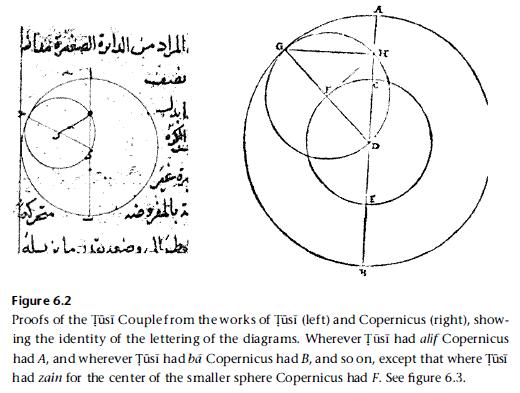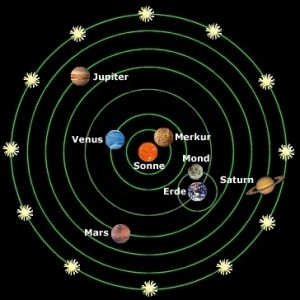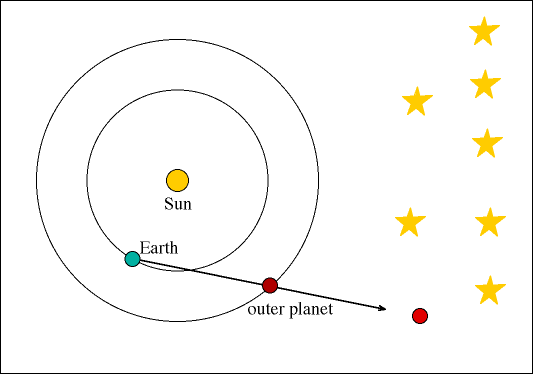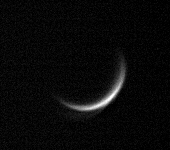
It is now evident that this earth really moves though to us it seems stationary. In fact, it is only by reference to something fixed that we detect the movement of anything. How would a person know that a ship was in movement, if, from the ship in the middle of the river, the banks were invisible to him and he was ignorant of the fact that water flows? Therein we have the reason why every man, whether he be on earth, in the sun or on another planet, always has the impression that all other things are in movement whilst he himself is in a sort of immovable centre; he will certainly always choose poles which will vary accordingly as his place of existence is the sun, the earth, the moon, Mars, etc. In consequence, there will be a machina mundi [scheme of the world/universe] whose centre, so to speak, is everywhere, whose circumference is nowhere, for God is its circumference and centre and He is everywhere and nowhere. |
Copernicus published an early description of this model in 1530 in a private manuscript but full publication was delayed until 1543 to avoid the wrath of the Church. The major difference in quality between the models of Aristarchus, Ptolemy and de Cusa was that Copernicus worked out his model in full mathematical detail but the resulting system/device was every bit as complicated as the Ptolemaic model. His model also has equally spaced circular orbits between the planets (in actuality this holds rather true for Mercury thru Mars). Equally space perfectly circular orbits again represents harmony and order in Nature. He also uses the Aristotelian mechanism of a Prime Mover to account for the original motion
Excellent 1923 description of the Astronomical System of Copernicus
Like the geocentric model, this heliocentric model is just a model but it needs to be able to explain all of the available observations and anamolies (e.g. retrograde motion). It also gave a more natural explanation for why Venus and Mercury are never very far apart in the sky from the Sun.

The Dissent of Martin Luther
But that is how things go nowadays. Anyone who wants to be clever must not let him-self like what others do. He must produce his own product, as this man does, who wishes to turn the whole of astronomy upside down. But I believe in Holy Scripture, since Joshua ordered the sun, not the earth, to stand still. |
Note the above is in response to Joshua Verse 10 in which the Sun is purported to have stayed visible in the sky for one whole (24 hour day). Luther's quote is the context of, the sun going around the Earth as the right system and only God can command the sun to stand still in that system (the Earth is already still).
And this from the 1549 Textbook by Melanchthon:
Out of love for novelty or in order to make a show of their cleverness, some people have argued that the earth moves. They maintain that neither the eighth sphere nor the sun moves, whereas they attribute motion to the other celestial spheres, and also place the earth among the heavenly bodies. Nor were these jokes invented recently. There is still extant Archimedes' book in which he reports that Aristarchus of Samos propounded the paradox that the sun stands still and the earth revolves around the sun.Even though subtle experts institute many investigations for the sake of exercising their ingenuity, nevertheless public proclamation of absurd opinions is indecent and sets a harmful example. Encouraged by this divine evidence, let us cherish the truth and let us not permit ourselves to be alienated from it by the tricks of those who deem it an intellectual honor to introduce confusion into the arts. |
Better still, from Jean Bodin a French Philosopher writing in 1596
No one who is in his right mind or who has had the slightest training in the physical sciences will ever believe that the dense and solid earth with its heaviness and weight simultaneously moves up and down, about its own center, and around the sun, while performing a libration (oscillation around an axis) |
However, while Copernicus does refute the Ptolemaic objections to the motion of the earth, he insists on circular motions, or motions compounded of circular motions: (these are copernicun epicyles):


We must however confess that these movements are circular or are composed of many circular movements, in that they maintain these irregularities in accordance with a constant law and with fixed periodic returns: and that could not take place, if they were not circular. For it is only the circle which can bring back what is past and over with; and in this way, for example, the sun by a movement composed of circular movements brings back to us the inequality of days and nights and the four seasons of the year. Many movements are recognized in that movement, since it is impossible that a simple heavenly body should be moved irregularly by a single sphere. For that would have to take place either on account of the inconstancy of the motor virtue -- whether by reason of an extrinsic cause or its intrinsic nature -- or on account of the inequality between it and the moved body. But since the mind shudders at either of these suppositions, and since it is quite unfitting to suppose that such a state of affairs exists among things which are established in the best system, it is agreed that their regular movements appear to us as irregular, whether on account of their circles having different poles or even because the earth is not at the center of the circles in which they revolve. |
 The Universe according to Copernicus, who had no idea what the stars were
in relation to this Universe.
The Universe according to Copernicus, who had no idea what the stars were
in relation to this Universe.
Note: Andreas Osiander, an ordained Priest, oversaw the publication of De revolutionibus orbium coelestium and added an unsigned preface explaining that the model described in the book was not intended as a description of the way the Universe really is, but as a mathematical device to simplify calculations involving the movement of planets
For it is the job of the astronomer to use painstaking and skilled observation in gathering together the history of the celestial movements, and then -- since he cannot by any line of reasoning reach the true causes of these movements -- to think up or construct whatever causes or hypotheses he pleases such that, by the assumption of these causes, those same movements can be calculated from the principles of geometry for the past and for the future too.But since for one and the same movement varying hypotheses are proposed from time to time, as eccentricity or epicycle for the movemenet of the sun, the astronomer much prefers to take the one which is easiest to grasp. Maybe the philosopher demands probability instead; but neither of them will grasp anything certain or hand it on, unless it has been divinely revealed to him. Therefore let us permit these new hypotheses to make a public appearance among old ones which are themselves no more probable, especially since they are wonderful and easy and bring with them a vast storehouse of learned observations. And as far as hypotheses go, let no one expect anything in the way of certainty from astronomy, since astronomy can offer us nothing certain, lest, if anyone take as true that which has been constructed for another use, he go away from this discipline a bigger fool than when he came to it. Farewell. |
This model also gives a natural explanation for the observed retrograde motion that Ptolemy struggled with:

Also this explained the variation in brightness observed for Mars. Copernicus, however, didn't understand whe they brighntess variations observed for Mars (due to differening Earth-mars distances) were substantially larger (by about a factor of 80! over 2.2 years) than the observed brightness variations of Venus.
In other words, the brightness variations of Venus were smaller than they should be given the large range in distance variations between the Earth and Venus. That is, he did not understand that Venus would have phases. Although he should have understood this explicity as it just simple geometry. This is a good indication that Copernicus really didn't understand the implications of this model.
When we can actually observe Venus (the time in which the angular distance between the earth-sunand-venus is largest) its not in full phase mode but in 1/2 phase, when Venus is farthest from the Earth (and hence behind the sun so we can't actually see it) its in full phase and therefore the phase variations counter the distance variations so that the total brightness variations observed for Venus are only about a factor of 2.5.

Based on this information alone, it was scientifically reasonable to reject the Copernicun Model
Galileo's telescopic observations of Venus which revealed its phases was a crucial confirmation of the Copernicun model as there are no phases of Venus in the Ptolemaic system.

The most important aspect of Copernicus' work is that it forever changed the place of man in the cosmos; no longer could man legitimately think his significance greater than his fellow creatures; with Copernicus' work, man could now take his place among that which exists all about him, and not of necessity take that premier position which had been assigned immodestly to him by the theologians.
Goethe's Comment on Copernicus:"Of all discoveries and opinions, none may have exerted a greater effect on the human spirit than the doctrine of Copernicus. The world had scarcely become known as round and complete in itself when it was asked to waive the tremendous privilege of being the center of the universe. Never, perhaps, was a greater demand made on mankind - for by this admission so many things vanished in mist and smoke! What became of our Eden, our world of innocence, piety and poetry; the testimony of the senses; the conviction of a poetic - religious faith? No wonder his contemporaries did not wish to let all this go and offered every possible resistance to a doctrine which in its converts authorized and demanded a freedom of view and greatness of thought so far unknown, indeed not even dreamed of." |
But Really, has anything "vanished" in mist and smoke concerning
our collective appraisal of where we stand in the Cosmos ??? Did the Copernican Doctrine have
any culutural affect at all (i.e. do we behave with more reverance towards nature know
that we have been shown that the Earth is not a special place in the Cosmos?